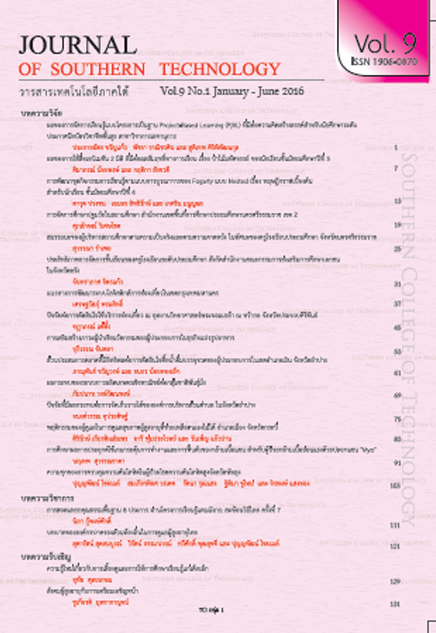การศึกษาพฤติกรรมด้านการมีภูมิคุ้มกันในตนเอง ตามหลักปรัชญาเศรษฐกิจพอเพียงของนักศึกษา: กรณีศึกษา นักศึกษามหาวิทยาลัยกรุงเทพ
Main Article Content
Abstract
ผลการวิจัยพบว่า นักศึกษามหาวิทยาลัยกรุงเทพมีภูมิคุ้มกันในตนเองตามหลักปรัชญาเศรษฐกิจพอเพียงอยู่ในระดับค่อนข้างสูง และสมการการถดถอยโลจิสติกทวิที่ประกอบด้วย ตัวแปรอิสระ 3 ตัว คือ เพศ ผลการเรียน และ การทำกิจกรรมกับครอบครัว สามารถใช้ทำนายกลุ่มของนักศึกษามหาวิทยาลัยกรุงเทพที่มีภูมิคุ้มกันในตนเองอยู่ในระดับสูงและระดับต่ำได้อย่างมีนัยสำคัญทางสถิติที่ระดับ .05 โดยสมการสามารถทำนายได้ถูกต้องโดยรวมร้อยละ 71.2 ส่วนอายุ รายได้ครอบครัว ขนาดครอบครัว และสภาพการพักอาศัยไม่มีผลในการทำนายภูมิคุ้มกันในตนเองของนักศึกษา
A Study on Students’ Self-immunity Behaviors under the Philosophy of Sufficiency Economy: Case of Bangkok University Undergraduate Students
This study is a survey research that aims to investigate the self-immunity behaviors under the Philosophy of Sufficiency Economy (PSE) of Bangkok University students, and determine factors predicting their self-immunity behaviors under the PSE. A 36-item of the Multi-dimensional Test Construction of Psychological Immunity based on the PSE was conducted with a sample of 312 students, who was recruited by the technique of simple random sampling from Bangkok University students. The obtained data were analyzed by percentage, mean, standard deviation, and were also analyzed by a binary logistic regression. The findings showed that the attending students had a fairly high level of self-immunity behavior under the PSE. The binary logistic regression model which utilized three independent variables including gender, grade point average, and number of activity with family was able to predict the self-immunity behaviors under the PSE of Bangkok University students who were at the range of high and low level with overall accuracy of 71.2%. However, age, family income, family size, and type of residence were not significant factors of self-immunity behavior, at the .05 level.
Article Details
-
Authors must agree to the journal publication rules and allow the editors to edit the manuscripts for publication.
-
Author’s right belongs to the author but Journal of Southern Technology holds the right of first publication and thus allow readers to use the article for the purpose of education but not commercial.

